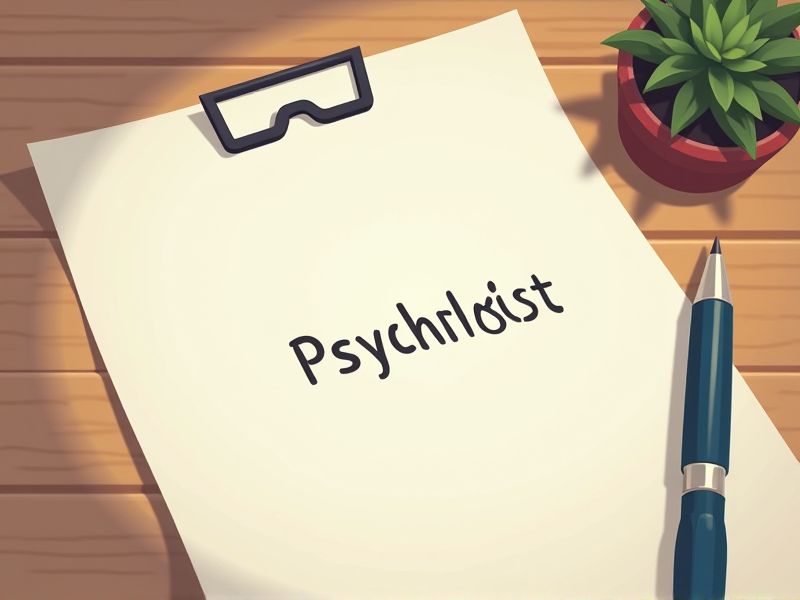
Psychologists deal with complex human behaviors and mental processes, necessitating a thorough understanding backed by formal credentials. These certifications ensure adherence to established guidelines, promoting trust and competence in the field. Moreover, specific certifications often signify specialized expertise, enhancing a psychologist's ability to address diverse client needs. Below are some crucial certifications required for psychologists.
Licensed Psychologist (State License)
A state license ensures that a psychologist has met specific professional and educational standards, which maintains the integrity of the field and protects clients. It provides a mechanism for accountability, as licensed psychologists are subject to ethical codes and disciplinary action if standards are breached. The licensing process, including exams, ensures competence in understanding complex psychological issues and effective treatment methods. It allows psychologists to legally offer services, which is essential in settings like hospitals, schools, or private practice where mental health care is provided.
American Board of Professional Psychology (ABPP) Certification
Earning an ABPP certification can enhance professional credibility, as it signifies that a psychologist has met rigorous standards in their specialty. The certification often results in improved career opportunities, such as higher-level positions and leadership roles. It may also lead to increased earning potential, as employers and clients often perceive board-certified psychologists as more competent. ABPP certification can be a differentiator in competitive markets, providing a psychologist with a distinct advantage in establishing trust and authority with clients and employers.
Examination for Professional Practice in Psychology (EPPP)
The EPPP serves as a standardized assessment to ensure all practicing psychologists meet a minimum level of competency across essential psychological domains. Passing this exam is crucial as it helps maintain public safety by ensuring practitioners are qualified to handle psychological issues effectively. The EPPP's comprehensive coverage of topics reflects both the theoretical and applied aspects of psychology, promoting consistent professional standards nationwide. Being a licensing requirement in many jurisdictions, it fosters uniformity in the qualifications and capabilities of psychologists across different states and regions.
Certified Cognitive Behavioral Therapist (CBT)
Psychologists with certification in Cognitive Behavioral Therapy (CBT) are equipped to effectively treat a range of mental health disorders, including anxiety and depression, which rely on structured therapeutic techniques. This certification ensures that they possess specialized skills in evidence-based practices, enhancing treatment outcomes. The structured and goal-oriented nature of CBT can lead to significant and measurable improvements in patients' mental health. Certification provides validation of competence, fostering trust and credibility with patients and other professionals.
Certified Clinical Trauma Professional (CCTP)
The prevalence of trauma-related disorders has increased the demand for psychologists specialized in addressing complex trauma. Obtaining the Certified Clinical Trauma Professional designation equips psychologists with evidence-based interventions tailored for trauma-affected individuals. This specialized credential enhances a psychologist's ability to effectively treat and support clients, leading to improved therapeutic outcomes. Clients are more inclined to seek assistance from therapists recognized for their expertise in trauma recovery, promoting better mental health outcomes in communities.
Certified Addiction Counselor (CAC)
A Certified Addiction Counselor (CAC) provides specialized expertise in substance use disorders, essential for psychologists dealing with patients experiencing addiction. This specialization enhances the psychologist's ability to design effective, evidence-based treatment plans tailored to the unique needs of individuals with addiction issues. The collaboration between a psychologist and a CAC facilitates a comprehensive approach to mental health, addressing both psychological issues and substance use concerns concurrently. As substance use disorders often co-occur with mental health disorders, the integration of CACs ensures more holistic and effective patient care.
Board Certification in Neuropsychology
Board Certification in Neuropsychology establishes a nationally recognized standard of competency, ensuring high-quality care in the evaluation and treatment of neurological conditions. This credential enhances credibility and trust, facilitating better collaboration with medical professionals in interdisciplinary settings. It also aids in distinguishing specialized expertise in neuropsychological assessments from general psychological practice. This certification often leads to increased job opportunities and professional growth due to demonstrated commitment to maintaining cutting-edge knowledge and skills.
Certified Forensic Psychologist
Forensic psychologists apply psychological principles to legal issues, aiding courts in understanding mental health aspects relevant to cases. They conduct competency evaluations to determine if defendants can stand trial, influencing legal proceedings. Their assessments can help in criminal profiling, enhancing the accuracy of investigations. Their expertise in risk assessment assists in predicting reoffense probabilities, impacting sentencing decisions.
Certified Child and Adolescent Psychologist
The development of children and adolescents entails unique psychological challenges that require specialized expertise only a Certified Child and Adolescent Psychologist can offer. This certification ensures that the psychologist possesses advanced skills and knowledge tailored specifically to the mental health needs of younger populations. Such specialization aids in accurately diagnosing and effectively treating conditions prevalent among children and teens, such as ADHD and depression. As mental health issues in younger demographics often manifest differently than in adults, certified professionals play a crucial role in bridging this understanding gap.
Mental Health First Aid Certification
Possessing a Mental Health First Aid Certification equips psychologists with a structured approach to identifying, addressing, and managing mental health crises, enhancing their overall skill set. The certification provides evidence-based guidelines that improve emergency intervention, which can be crucial in preventing escalation of psychological distress. It also promotes up-to-date knowledge on mental health issues, ensuring psychologists stay informed about recent developments in the field. The certification can facilitate better communication and trust with clients, as it demonstrates a commitment to comprehensive care and continuous professional development.
Summary
By obtaining certifications, you enhance your credibility and demonstrate expertise in specialized areas of psychology. This recognition can lead to increased client trust and potentially expand your client base. Employers might prioritize your skills and knowledge over non-certified individuals, opening up more career opportunities. Certifications can also lead to potential salary advancements, reflecting your commitment to professional growth.
